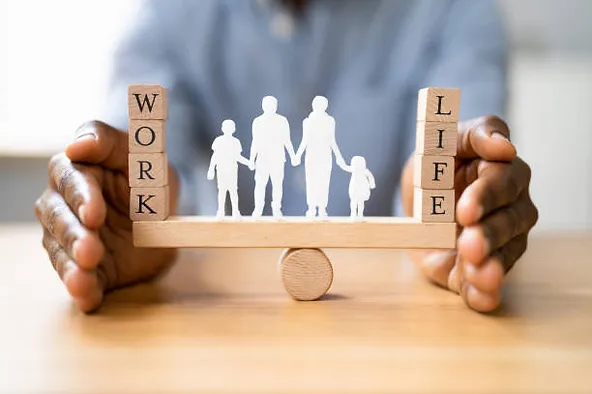Striving for work-life balance isn’t a zero-sum game. Being fully present wherever you are, and whoever you are with, is what matters.
Right up there with win-win in the office lexicon, you’ll be familiar with the tired term, work-life balance. But, in truth, there is no such thing. In fact, I’d go so far as to say that the very idea is an insidious lie. It implies that “work” and “life” are two different things. If “work” is not “life,” then what is it? Death. Which, of course, it isn’t.
But even I agree that there is some reality behind the catchphrase. To manage being a devoted family member and spouse, plus a high-performing leader or business owner, sometimes is a balancing act – one everybody wants to master.
And, good news, mastering it absolutely does not require you to be a slacker in either area.
In fact, one study found that top performers in business are the people most likely to achieve happiness in all dimensions of their lives. What person, and what person’s family, doesn’t want that? If you’ll forgive me, I’ll call that a “win-win.” Here are three steps to get you there.
1. Work harder at loving your whole life.
If you think there should be a bright line separating “work” and “life,” you are missing out on fulfillment. Consider the philosophy of one of our era’s most successful entrepreneurs, Jeff Bezos of Amazon, who thinks the whole separate-existence idea is too limiting. “The reality is, if I am happy at home, I come into the office with tremendous energy,” he said. “And if I am happy at work, I come home with tremendous energy.”
So, instead of thinking of this as a zero-sum tradeoff, try giving 100 percent to your work and 100 percent to your personal life. Both deserve the best from you. For us mid-career adults, that translates to: love your job with sincerity and conviction. But also love your home life, and commit to that as well, unequivocally, all the time.
2. View your life as a circle you complete, not a finish line to aim at.
As Bezos describes it, and I agree, your life is not a railroad track that stops you at Point A in the morning and Point B in the evening. It’s more of a circle that contains everything you do and care about, with you at its center.
There’s no doubt that being happy and satisfied with your life 200 percent of the time is not easy. It requires work to turn work into play. Rather than feel guilty that you’re not home during the day, then guilty that you’re enjoying yourself during your off hours, be truly present in whatever place you find yourself, and tune in fully to the people who are with you – whether employees, colleagues, customers, or your loved ones at home. That requires that you bring your best self, and that you recognize and accept there is “some assembly required” to maintain those relationships. To understand that concept, let’s take a little trip to IKEA.
3. Appreciate what’s great about doing the work.
What has ready-to-assemble furniture got to do with balance in your life? Surprisingly, quite a bit. A Harvard Business School working paper explored the “IKEA Effect” – the idea that if personal labor is involved, satisfaction increases. If you go to IKEA and buy a piece of furniture and assemble it yourself, you are happier with the purchase than if it came already assembled, the report concluded. Needing to do a little labor doesn’t take away from happiness; it adds to it.
Let’s substitute “love” for “labor.” Doesn’t it make sense that if you do the work of bonding and getting close to the people you work with, and experience strong feelings of commitment and attachment to your projects, your people, and your place of work, you will be more satisfied with the experience? And from there, doesn’t it also make sense that employees will appreciate your deep commitment, customers will feel better taken care of, and you will be a better leader?
And, to Bezos’ observation, how can that experience not carry over to your relationships and activities at home too?
Life is life. You live some of it at home and with friends and family and some of it in your work responsibilities with colleagues, customers, and, yes, friends.
Work-Life Balance
Do we have to balance our roles and responsibilities? Do we have to balance our relationships? Do we have to balance the things we do for a paycheck with the things we do strictly for fun? Yes, to all the above. But we don’t balance “work” and “life.” We live. And we need to maximize our life experience wherever we are, in whatever activity we’re engaged in.
So, I’m driving a stake through the phrase “work-life balance” and so have my clients. How about you?







